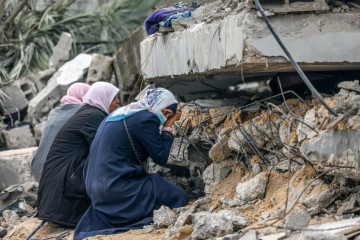

More than nine months after Israeli armed forces escalated their attacks on Gaza, the impacts have been catastrophic. Beyond the visible destruction, the region suffers from severe mental scars and ongoing trauma.
The SAWA Foundation, established in 1998, is a prominent Palestinian institution located in Ramallah, West Bank. The organisation provides vital support to survivors of violence through its helpline, counselling services, and mobile clinics.
Since October 7, SAWA has had to suspend its mobile clinics due to sporadic checkpoint closures. Consequently, all psychological support and information services are now limited to telephone calls.
Unsurprisingly, the number of calls to SAWA has surged since the intensified bombardment of Gaza.
To illustrate, in August 2023, SAWA’s team of 22 counsellors received 1,334 calls, with women comprising the majority (750). In the weeks following October 7, the association conducted 3,148 counselling sessions in November 2023, mostly from men (1,787).
“Since the war, it has been completely different,” psychotherapist and helpline officer Muna Odeh told The New Arab.
She described the calls as “more intense,” noting that “most callers now want to discuss grief, as they have sometimes lost 15 or more family members. Before, most calls were about family conflicts, relationship problems, and gender-based violence (GBV).”
Muna explained that gender-based violence (GBV) has increased as people struggle to survive in complete chaos.
“There is no system, no shelters for women. We feel handcuffed because we want to help them, but there is nowhere safe for them to go,” she said.
Gender roles in Gaza have shifted drastically as the death toll rises, forcing families to adapt rapidly from one day to the next.
“Many of the women’s husbands are injured and they find themselves doing the job of both parents and doing all the jobs like getting food and water.”
Violence everywhere
Data by the Palestinian Central Bureau of Statistics (PCBS) indicates more than 87,000 homes have been destroyed. Over the course of five months after October 7, SAWA received 2,400 calls discussing home destruction and 1,125 calls related to displacement.
Being forcibly displaced multiple times presents specific challenges. Muna explained that violence in Gaza is either a direct or indirect consequence of the destruction.
Muna shared with The New Arab harrowing accounts of direct violence. "You wouldn’t believe the stories we’ve heard," she said. "We had one caller who was arrested by the IDF shortly after a C-section. The soldiers beat her repeatedly, deliberately targeting the area of her wound."
In another deeply traumatic incident, a woman recounted to SAWA that IDF soldiers demanded to search her in the presence of both male and female soldiers inside a tent.
The Palestinian woman refused to undress while the male soldier was present, and eventually, he turned away while the female soldier conducted the search.
Muna expressed that for the woman, this was the "most shameful moment in her life," emphasising the cultural degradation and humiliation despite the soldier not being able to see her.
In many of the calls related to domestic abuse, SAWA’s team examines whether the physical violence occurred before or after the war.
Muna explained that most survivors report experiencing violence before the war, but it has intensified since.
With many people now displaced into tents, domestic violence has taken on a new dimension.
"Previously, people were less aware of who was suffering from violence. However, in the crowded camps, if a man is abusive to his wife, everyone hears it and knows about it. This not only affects the person enduring the abuse but also adds to the stress knowing that all their neighbours are aware."
More men calling than women
Contrary to the stereotype that men are less inclined to express their emotions or seek support, this norm has been challenged in Gaza.
"We receive numerous calls from men who simply want to talk and release their emotions by crying," Muna explained.
Furthermore, SAWA has emerged as a valuable resource for parenting guidance.
"In March alone, SAWA conducted 176 sessions with parents to address how to handle their children's trauma," Muna added.
"Previously, we didn't receive calls from men seeking assistance with their children, but now we're hearing from fathers who describe their children's new behaviours, such as bedwetting, since the war. They reach out to us for advice."
A common topic men want to discuss is stress related to financial struggles. New data shows the unemployment rate has reached over 79% since October 2023, according to the International Labour Organisation.
Financial hardships and shortages of essential food items are causing families to struggle to feed their children.
"Many men express to us that they regret not passing away before reaching the point of witnessing their children go hungry, with no solutions in sight," Muna concluded.
Olivia Hooper is a British journalist based in Morocco specialising in humanitarian and gender-based topics. She also works as co-lead of communications and marketing at Politics4Her



 Follow the Middle East's top stories in English at The New Arab on Google News
Follow the Middle East's top stories in English at The New Arab on Google News


